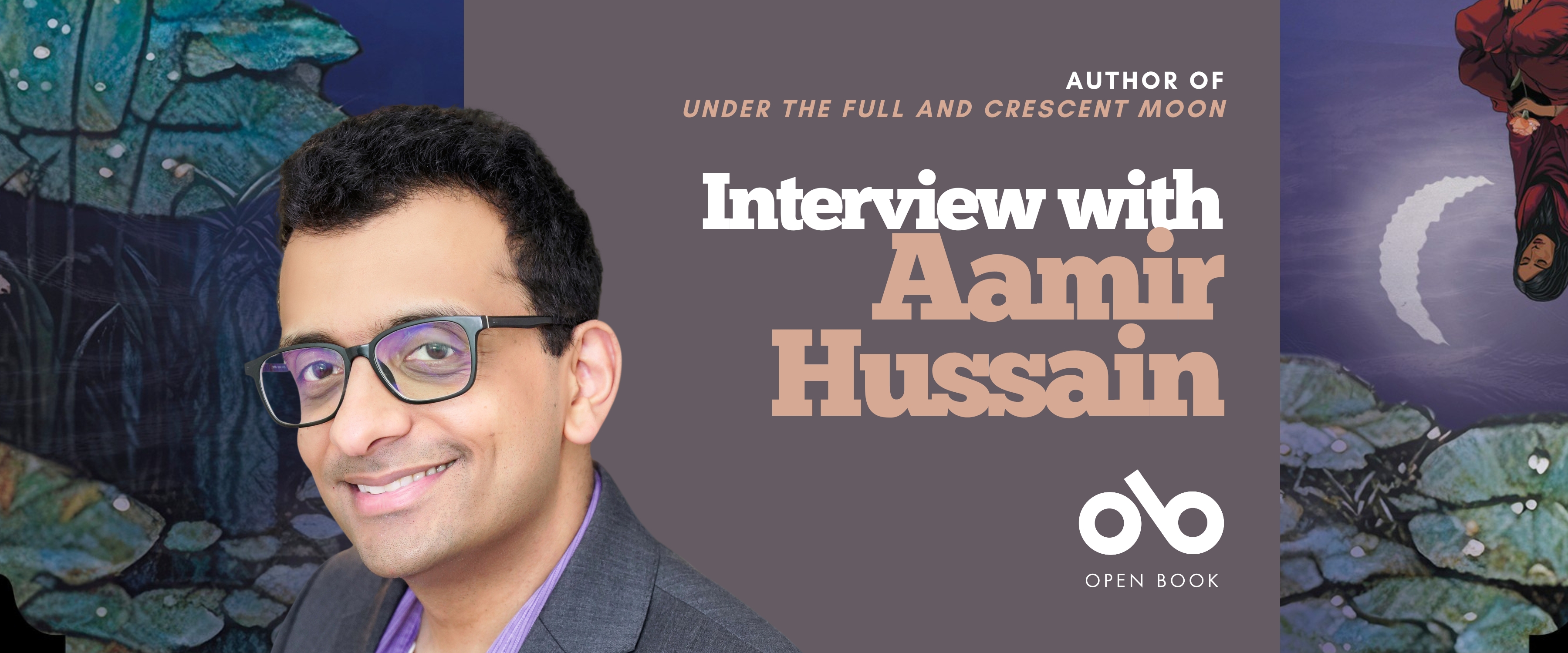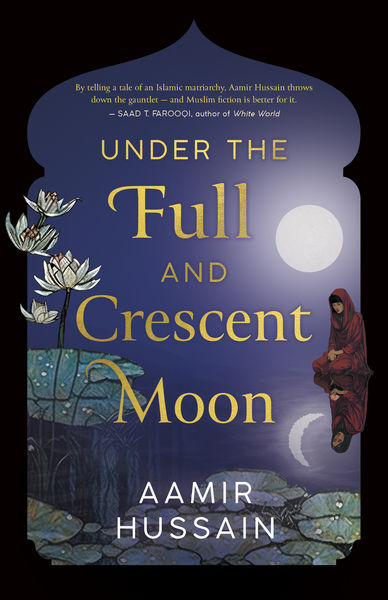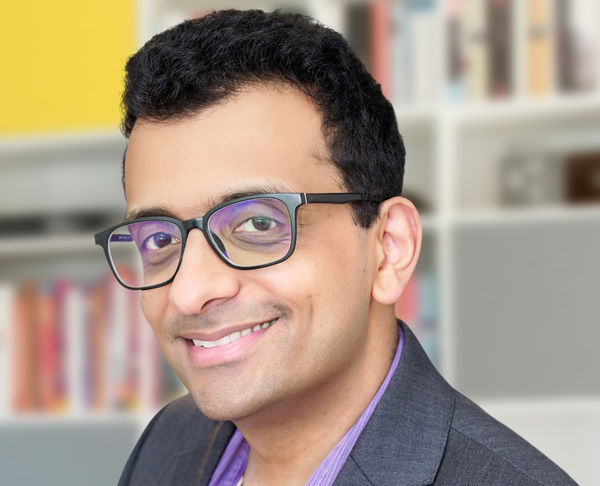Aamir Hussain Makes his Debut with the Impressive Historical Novel, Under The Full and Crescent Moon
In his dazzling new historical novel Under the Crescent Moon (Dundurn Press), author Aamir Hussain invites readers into the vibrant world of Medina’tul-Agham, a medieval hilltop city where intellect and courage collide. At the heart of the story is Khadija, an introverted young woman whose quiet life among books is upended when she steps into the role of assistant to her father, the city’s foremost jurist. Suddenly thrust into the rhythms of city life, Khadija must navigate a society unlike any she has known, discovering the strength and influence of women in a matriarchal community guided by Imam Fatima and the formidable Circle of Mothers.
As Khadija learns to find her voice, Aamir Hussain paints a world rich with culture, tradition, and intellectual debate. Through the warmth of friendship and the guidance of wise mentors, the protagonist blossoms into a figure capable of shaping her community. The novel celebrates female empowerment and the transformative power of knowledge in a period often overlooked in mainstream historical fiction. Readers will delight in the city’s bustling streets, the intricate social dynamics, and the quiet moments of introspection that reveal Khadija’s growing resolve.
The stakes rise when fanatical forces seek to upend the city’s harmony by weaponizing Sharia law against its own people. Armed with nothing more than her parchment and quill, Khadija must rally her fellow citizens and craft fatwas that champion justice and preserve the fragile peace. Aamir Hussain delivers a gripping tale of courage, intellect, and resilience, inviting readers to witness how one young woman’s words can alter the course of history.
Check out this fascinating Long Story Novelist Interview with the author, right here on Open Book!
Open Book:
Do you remember how you first started this novel or the very first bit of writing you did for it?
Aamir Hussain:
The very first bit of writing was the Prologue, which is by design very different from the rest of the novel. It not only introduces the world but shows what is unique about it at the end, in a bit of a ‘twist’.
OB:
How did you choose the setting of your novel? What connection, if any, did you have to the setting when you began writing?
AH:
This is a speculative historical novel. The historical part of it is the time period of the setting, which is right before the traditional schools of Islamic law as we know them today crystallized—early 9th century CE.
The speculative part is the imagined city it is set in, situated in an undetermined place close to both Africa and Europe. Quite a few of the elements of the city come from my memories of growing up in Karachi, which is very far from the Mediterranean. But every busy city has things in common, and I drew from my experiences.
Your CanLit News
Subscribe to Open Book’s newsletter to get local book events, literary content, writing tips, and more in your inbox
OB:
Did you find yourself having a "favourite" amongst your characters? If so, who was it and why?
AH:
This novel was very heavily plotted, and the entire cast of main characters was well defined before I even started. While I have an extreme fondness for the main character, Khadija, my favourite characters ended up being parts of the supporting cast that just showed up as they were needed, rolled up their sleeves, and got to work providing the connective tissue and differing perspectives that the novel needed.
They are also the ones that provided the most delightful surprises. In order of preference, they are:
- Amal, one of Khadija’s best friends.
- Sawda, a housekeeper who works for Khadija’s father, Fazlur.
- Bashar, a toady of the main antagonist, Wasaf.
OB:
Did you do any specific research for this novel? Tell us a bit about that process.
AH:
The novel started with extensive research on my Islamic faith and the history of Islamic law, prompted by mounting criticisms of Islam in the wake of 9/11. That this strengthened my faith rather than weakened it is why the novel exists at all.
The idea at the core of the story is whether a matriarchal system of government could exist within Islamic law. That led me to read translations of the Quran and learn about how Islamic law, or Sharia, evolved over the centuries, particularly how different practices spread through various parts of the world over time.
This confirmed academically what I already knew intuitively—that there are many different interpretations of what it means to be authentically Muslim. The story of a young woman defending a matriarchal understanding of the faith against more stereotypical patriarchal ones grew naturally out of that.
OB:
What was the strangest or most memorable moment or experience during the writing process for you?
AH:
The strangest part by far was writing fatwas, as many of the characters are muftis—legal experts authorized to issue legal and moral answers. I am absolutely not authorized to write fatwas by any stretch of the imagination, and I had to force myself to do it!
OB:
Did you celebrate finishing your final draft or any other milestones during the writing process? If so, how?
AH:
Unfortunately, my personality doesn’t allow me to dwell on my successes. My fourth draft was the one I felt was strong enough to show to the world. Until then, I had kept very quiet about writing a novel, and only my wife really knew the effort I was putting in.
Completing the first draft, however, was incredibly special. There was nothing quite like having the whole story complete on screen, even as rough as it was. I celebrated by taking a few months off before diving back in to fill in the unfinished parts for the second draft.
OB:
What, if anything, did you learn from writing this novel?
AH:
It’s a blessing to have had the opportunity to dedicate my time and energy to such a long project, and I’m grateful to have been able to take advantage of it.
This is not a small thing, as we see so many people around the world denied these possibilities due to oppression. I hope I can use my words, as limited as they are, to help create a reality where people in Palestine, Congo, Sudan, and many other oppressed communities have the same opportunities I have had.
I suppose what I have learned is that I’ve had a lot of good fortune, and I have a responsibility to try my best to pay it forward.
________________________________
Aamir Hussain was born into a family of strong women in Pakistan, grew up in Saudi Arabia, and moved to Canada when he was fifteen years old. He works in the tech sector in Toronto. Under the Full and Crescent Moon is his debut novel. He lives in Milton, Ontario.







